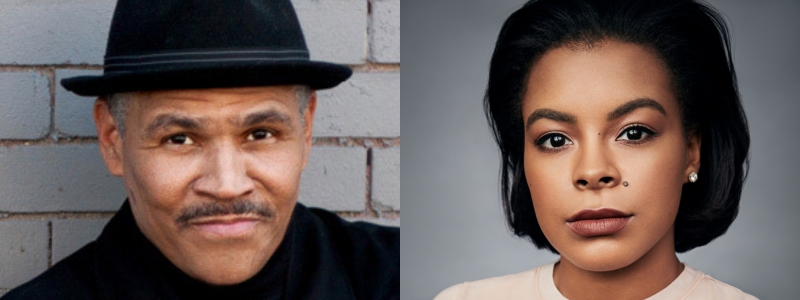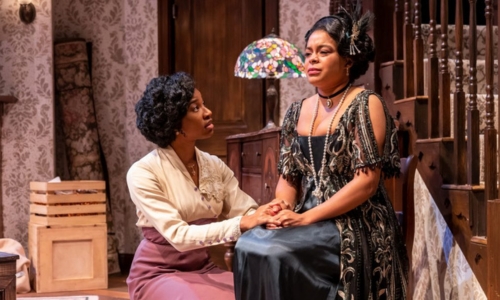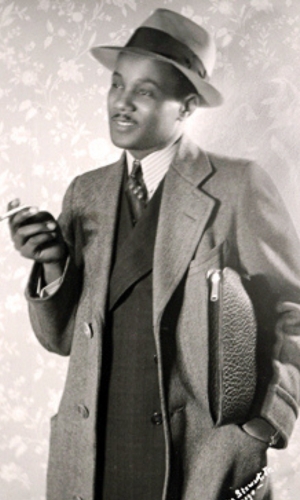In Conversation: Director Ron OJ Parson and Actor Ayanna Bria Bakari

Despite being set almost exactly one hundred years ago, Big White Fog is far from a relic. It remains as relevant as ever, skillfully bringing private conversations about family, race, and politics onto a public stage. It is a reckoning, a tightrope of hope and despair, and an unapologetically ambitious start to the 2025/26 season.
Director Ron OJ Parson and actor Ayanna Bria Bakari (playing Wanda Mason) recently met with Associate Director of Marketing Camille Oswald to discuss Theodore Ward’s masterpiece and its legacy. What followed was a conversation rich with admiration, depth, and urgency that perfectly set the stage for this sprawling, multigenerational family drama. Below is an excerpt of their conversation.
Can you tell me about your familiarity with each other’s work?
Ayanna Bria: This is our fourth show together. We’ve done Too Heavy for Your Pocket, Relentless at TimeLine and Goodman, Stick Fly at Writers, and then this one.

Ron: I had seen Ayanna Bria perform as a student at DePaul before we ever worked together. I like to get around and see young actors when they’re on the way up, the same way that Marcus Garvey talks about us knowing who we are, and paying it forward. I try to mix experienced and inexperienced performers so people can learn from each other. It’s a big cast—you don’t get to do big casts like this anymore—but again, that’s the spirit of paying it forward, as Garvey said. Those things are important; that’s part of the journey for me as a director who’s been doing this a long time. It’s important to do that—for us as a people, and us as thespians.
Ayanna Bria: It’s also a part of who you are, Ron. You are an amazing artist and amazing director, yes, but you’re also a teacher and a holder of so much wisdom and so many stories. It is important to you that you bring in young people to share these stories, and this knowledge, and this history. Most of the plays you do are so historical, so important to Black people, and some of the time, this is the first time young Black people are getting this information. Because of you, and because of directors like you, young Black people who aren’t getting this education finally get to get in touch with something they’ve never had access to.
Ron: Yeah, it keeps it alive. Stephen McKinley Henderson was that person for me, along with people like Anthony Chisholm, Paul Butler, Paul Carter Harrison, and Von H. Washington—not to mention being around August Wilson and Marion McClinton. I was surrounded by people like that, who I watched and learned from as a young actor, which is why I want to pay it forward myself.
Ayanna Bria: And that’s what Ron’s good at, too. He’s good at building families. I don’t think I’ve ever done a show directed by him where I haven’t walked away with a best friend, or somebody that I can call on forever. I have my actual sister with me on this one, so that’s really dope. Bakari sisters on stage together!
Big White Fog is massive. It spans decades, and features a cast of almost twenty characters. Can you talk about your preparation for such a monumental undertaking?
Ayanna Bria: I’ve been preparing for this play my entire life. A lot of the work that I’ve done, or that I’m asked to be a part of, is in direct alignment with how I was raised, how I was brought up. I really feel like my purpose as an actor is to tell stories that highlight and educate people about the Black experience, and the variety within it. The themes in Big White Fog are thoughts and ideologies I’ve heard growing up my whole life.
Ron: Life has prepared us. There’s a Marcus Garvey quote where he talks about how if we don’t know our past, we can’t progress and move forward, and Ted Ward—and Big White Fog— are a part of that past, and everything that came after.
If you look at Lorraine Hansberry, A Raisin in the Sun, you can see his influence. Every writer that came up during the Black Theatre Movement was influenced by Ted Ward—Ed Bullins, Joseph Walker, Lorraine Hansberry, PJ Gibson.
We need to know where we came from, and we still need to educate—now more than ever—because of what’s going on in the country. This play was funded by a federal grant. That would not happen today. We have to hold on to these kinds of works because they’re being diminished. They’re being wiped out. Plays like this—that talk about freedom, that talk about education, that talk about racism—need to be continued. Those stories need to be told.

Ayanna Bria: This play is the blueprint. Theodore Ward was born in 1902, so the things he’s discussing, the things he’s writing about, are things he knows because he sees them out his window. It’s not a recollection; it’s current. There are some very, very hard conversations in this play that some would argue white people shouldn’t be privy to. These are conversations that are held in Black households, and when you have family arguing, you don’t want to argue “in front of company.” That’s what this play feels like, and that’s why it’s brave, and so poignant and strong. It puts the argument in all of our households. Conversations about being of mixed blood versus being just a generation removed from slavery; these are private conversations that he must have experienced, or he must have known somebody who had these conversations, and documented them for us.
And this is why the history Ron was talking about is so important, because I could not tell you who my great, great, great, great, great-grandparents were. Ron couldn’t tell you who his great, great, great, great-grandparents were. We were cargo; that’s how we were coming into this country, and our names weren’t even jotted down. So, thank you, Theodore Ward, for writing the stories and the conversations that were happening at this time. For giving us a record.
So many of the themes in the play can be directly traced to slavery. Slavery did an incredible number on Black people, to this day. The way we look at Black people, the colorism, the constant conversation of light-skinned versus dark-skinned—Theodore Ward talks about that. It’s the house and the field. Under slavery, there was a master who decided that the light-skinned enslaved folk were superior to the darker-skinned enslaved folk, and the lighter you were, the closer you were to the house, the closer you were to success. That is all because of an education that the master, the white man, the overseer, inflicted on his “property.” An ideology of self-hatred that was birthed through colonialism and raised on the plantations. Just another of the oppressor’s many ways to control us.
Generations have been filtered through that system, have been born into it. By the time the play takes place, slavery is over, but that thought process still exists—except for those who take on the Garveyism, and the Black nationalisms, and the Pan-Africanisms. Those who were able to hold onto hope, despite all the trauma, because they knew that all Black people are beautiful and believed in our nobility. We see each of those different schools of thought in different characters onstage. I mean, Theodore Ward’s father was born into slavery, so that trauma was passed directly to him—he was this close to being enslaved himself—so, all of those ideologies at that time were valid because these people were all in survival mode.
Ron: Bringing the comparison up to today, that history of inequality still shows up. I mean, I got into the University of Michigan because of affirmative action. There’s a myth that affirmative action means universities are bringing in less intelligent people. No. I still had to have good grades, but all it meant was that they looked at me when they wouldn’t have looked at me before. And that’s the thing about the character Lester Mason in Big White Fog. When his college finds out that he’s quote, unquote, “colored,” and takes that scholarship away—that still happens.
Ayanna Bria: That’s why a lot of Black parents give their children Anglo names, like Emily, Martha… that’s why I use my full name. I’m about everything Black. You ain’t got to have it, but somebody will take it.
Ron: And Les’s disillusionment. He was so pumped up: “America is the way… I’m not African, I’m American.” Big White Fog deals with all of that. It’s intricate, and there’s a lot going on—even in moments where nothing is going on! I always say that the silence in a play speaks just as loud as the words, and this play has a lot of that—a lot of what’s going on in our psyche.
Ayanna Bria: The children are everywhere, taking in these conversations. Like you said, the silence and the psyche.
Ron: Exactly. Another thing is that we’re rehearsing three blocks from where the house is on 51st and Dearborn. It’s all just land now because they demolished it to build the throughway, but still, that spirit is there. It’s in the ground, it’s in the air.
Ayanna Bria: It’s kind of like this play is just a big foreshadowing, yeah? Because you have Daniel [Rogers], who basically invents the first projects.
Ron: All of that. Yes. I once had someone tell me that, because I don’t live [on the South Side], it’s not my community. The community is us. It’s all of us. It’s the ancestors. It’s my colleagues. It’s my family, blood, and friendship. It’s the universe of us as a people. The South Side has been a very important part of who I am, even though I’m not from Chicago. That’s why I thank Charlie [Newell] and the Joyce Foundation, because they put me in a vein. As we progress, and as the theatre has progressed over the years… to culminate with a play like this about the South Side of Chicago—feels like a full-circle moment. These are the kinds of plays that fulfill you as an artist. This will be part of Court’s lasting legacy.
Experience this South Side classic, onstage from September 12 – October 12, 2025. Tickets are available online or by calling the Box Office at (773) 753-4472.